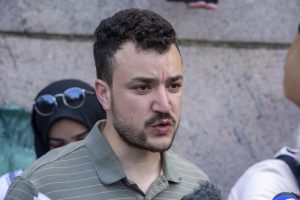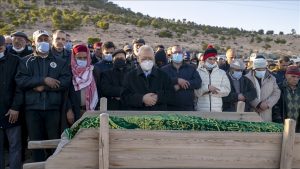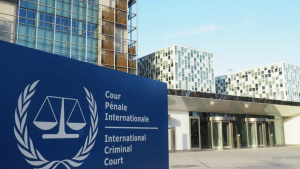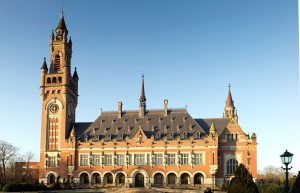By Leila Barghouty
Journal of Global Rights and Organizations, Associate Articles Editor
New York City, U.S. — Mahmoud Khalil, a recent Columbia graduate and lawful permanent resident who was arrested by Immigration and Customs Enforcement (“I.C.E.”) on March 8 and faces deportation, will remain at a detention facility in Louisiana while the court determines whether or not to grant a motion to compel that would require the government to return Khalil to New York City, where he lives and was arrested.
 |
The motion was heard as part of a brief hearing before Judge Jesse M. Furman — a federal judge of the United States District Court for the Southern District of New York — on March 12, during which Judge Furman also ruled that Khalil would be granted one attorney-client call on March 12 and one the following day. Khalil had been previously barred from speaking to his lawyers or family while in detention.
Despite being a green card holder, many believe Khalil has been targeted for his role as a pro-Palestine student activist. A petition for the writ of habeas corpus was filed by Khalil’s attorney, Amy Greer, on March 9, stated that this activism included “calling on the rest of the world to stop providing weapons and support to enable the genocide in contravention with international law.” The petition stresses that speech regarding international law and the obligations of the U.S. therein is “clearly protected by the First Amendment.” During his arrest, I.C.E. agents indicated that Khalil’s green card may have been revoked without due process. A March 10 order by Judge Furman blocked Khalil’s deportation pending court order.
The American Civil Liberties Union and the New York Civil Liberties Union joined Khalil’s legal team shortly after his arrest. An amended petition for the writ of habeas corpus was filed on March 13. The amended petition states that the respondents, members of the Trump administration, have adopted a retaliatory policy to punish non-citizen protesters who are critical of Israel, a U.S. ally. A motion to compel under the All Writs Act, 28 U.S.C. § 1691, was also filed on behalf of Khalil for an order to return him to New York for the duration of proceedings.
Khalil’s arrest has gained widespread criticism by First Amendment and international human rights advocates as many view it as an attempt by the Trump administration to chill free speech — particularly by international students on college campuses — as it ramps up aggressive deportation campaigns. The ACLU called Khalil’s arrest and possible deportation “unlawful” and a representation of the administration’s “efforts to silence speech of which they are critical.”
For further information, please see:
ACLU – Khalil v. Trump, Amended Petition for Writ of Habeas Corpus and Complaint – 13 Mar. 2025
ACLU – Khalil v. Trump, Notice of Conference – 10 Mar. 2025
ACLU – Khalil v. Trump, Petition for Writ of Habeas Corpus – 9 Mar. 2025
PACER – Khalil v. Trump, Order of the court – 12 Mar. 2025



